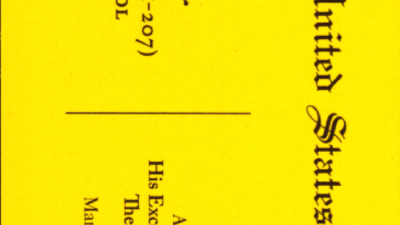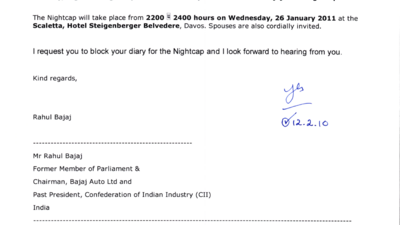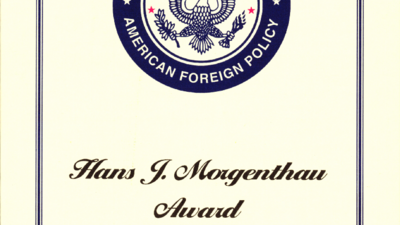Invitation to Luncheon Honoring Prime Minister Pascoal Manuel Mocumbi
Title
Date
Contributor
Summary
This document is an invitation transmitted via fax from the Office of Protocol, US Mission to the UN, dated March 16, 2000. It is addressed to Mr. Elie Wiesel, with an annotation for the attention of Renee Spitz. The invitation is extended by The Honorable Richard C. Holbrooke, Representative of the United States of America to the United Nations, requesting Mr. Wiesel's presence at a luncheon. The event is held in honor of His Excellency Mr. Pascoal Manuel Mocumbi, the Prime Minister of the Republic of Mozambique. The luncheon is scheduled for Monday, April 10, 2000, at 1:00 p.m., at The Waldorf Astoria Towers, located at 100 East 50th Street, Suite 42A. The document also includes an RSVP phone number and a note requesting advice on any dietary restrictions.
More Sources Like This

This document is an admission ticket issued by the United States Congress for a reception held in honor of His Excellency Binyamin Netanyahu, the Prime Minister of Israel. The reception took place on March 3, 2015, at 12:00 p.m., in the Rayburn Room (H-207) of the United States Capitol. The ticket specifies that it is for the 114th Congress and is non-transferable. Guests are required to present a government-issued photo identification card along with the ticket for entry and re-entry.

This document is an email invitation from Rahul Bajaj, Chairman of Bajaj Auto Ltd and Past President of the Confederation of Indian Industry (CII), to Professor Wiesel. The email invites Professor Wiesel and their spouse to the annual Bajaj Auto Nightcap, scheduled for Wednesday, January 26, 2011, from 2200 to 2400 hours. The event is to be held at the Scaletta, Hotel Steigenberger Belvedere, in Davos, coinciding with the 41st Annual Meeting of the World Economic Forum. The sender requests the recipient to mark their diary for the event. Ms. Hema Malini is listed as the RSVP contact. A handwritten annotation of 'yes' and '12.2.10' is visible on the document, likely indicating a response or internal note.

This document is an invitation from the National Committee on American Foreign Policy, Inc. for the presentation of the Hans J. Morgenthau Award to Secretary of State Colin L. Powell. The event is scheduled for Thursday, September 12, 2002, at The Waldorf-Astoria, New York City, with Bill Moyers serving as Master of Ceremonies. The document also provides background information on the National Committee, which was founded in 1974 by Professor Hans J. Morgenthau, and details about the Hans J. Morgenthau Award, established in 1981, including a list of past recipients. Additionally, it lists the organization's officers, trustees, and board of advisers for 2001, and recipients of other awards like the Kennan Award and the William J. Flynn Initiative for Peace Award.
of
Herbert Broh
Herbert Broh was born in Berlin, Germany in 1930. He shares his childhood memories of his life in Germany and his family’s journey to Shanghai. Herbert relates several experiences of abusive antisemitism by his friends and his teacher, as well as his impressions of Kristallnacht.
His family left Germany for Shanghai in April of 1939 to join family members already living on Seward Road in the Hongkew section of Shanghai, under Japanese occupation. Herbert was enrolled in the Kadoorie School and later a cheder. He talks about his Jewish education at the cheder and the Yeshiva Katana in great detail, as well as the effect of his growing orthodoxy on his life and his family. He describes his family’s living conditions and life in Shanghai and states he was very happy there. He was only dimly aware that other refugees had a more difficult existence. His father worked for a Chinese factory managed by Japanese; his mother worked as a cook at the Komor Kindergarten.
After Pearl Harbor, his family was evacuated to the Kadoorie School. He mentions interaction between Japanese and refugees. He vividly describes the events during and after the Japanese capitulation and the arrival of Chinese Nationalist and later American troops. He witnessed the departure of the entire Mirrer Yeshiva to Canada in 1946. Herbert and his family went to the United States in 1947. He describes his life in the United States and his feelings about his years in Shanghai. He is now a Cantor in Sun City, California.
Interviewee: BROH, Herbert Date: October 15, 1999
of
Fred Stamm
Born in Wrexen, Germany, in 1919, Fred Stamm was one of four children. Their father was a poor cattle dealer. Fred describes his limited early education in a Jewish school in Warburg and in the local Gymnasium, from 1930 until 1933, when a Nazi decree forced Jewish students out. His two sisters were transferred from Jewish to Catholic school, protected by the nuns.
He illustrates the effect of pre-war Nazi influence in Wrexen. His grandmother befriended villagers with clothing and bedding after a disastrous flood, but at her funeral in 1934 her casket was stoned by village youths. Fred served as an apprentice with a cabinet maker until 1938, when he was forced into a Jewish labor unit.
During the night of November 9, 1938, strangers broke into the Stamm house, ransacking the ground floor while the family, in bed upstairs, was unmolested. The next morning, Fred and his brother were advised to leave town and ride the railroads for several days. When they returned they found all the males in the town, except their ill father, were taken to a concentration camp. Most of them later returned home.
Within the next few months, both brothers left Germany for the United States, sponsored by their cousin, a gynecologist in Philadelphia where Fred quickly found work repairing furniture.
In 1942, Fred and his brother served in the United States Army even though they were considered German enemy aliens. He served in the Air Force as an aircraft mechanic, and refused European duty until granted American citizenship. He was sent to China with a fighter squadron to bomb Japanese-occupied territories. Fred returned to Philadelphia, married, raised two children and became a student of Jewish history at Gratz College.
See also the testimony of his wife, Ilse Stamm.
Interviewee: Fred Stamm Dater: June 1980
of
Hans Hartenstein
Hans Hartenstein was born January 27, 1923 into a Jewish family in Vienna. He describes his father, owner of a printing business, as a decorated Austrian veteran of World War I who knew of the persecution of Jews in Germany but believed that he would not be affected by Nazi oppression. After the Anschluss, his father was arrested on April 13, 1938 and was detained in Dachau and Buchenwald for 13 months. When Hans was forced to leave his Gymnasium, he joined Hashomer Hatzair as an avid Zionist, preparing for emigration to Palestine in a hakhsharah camp near Vienna. He describes illegal shortwave broadcasts and crowded living conditions after his father’s business and the family apartment were confiscated. Unable to obtain a Palestinian emigration certificate, he left for England with help from the British Society of Friends in August 1939. His father had emigrated to England following his release from concentration camp in May 1939, also with help from British Quakers. Hans describes refugee life in England and their concern about his mother’s safety in Vienna. She emigrated to the U.S. in January 1940; Hans and his father joined her within that year. Brief mention is made of a cousin who survived in hiding with aid from a Dutch farmer.